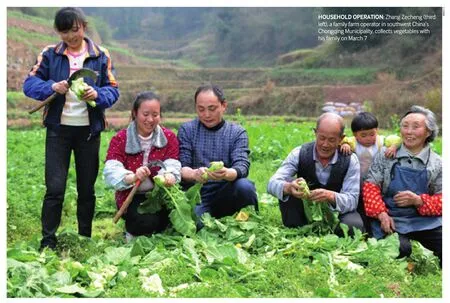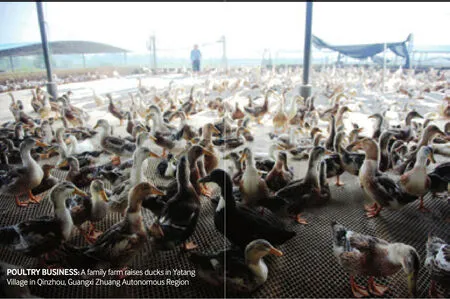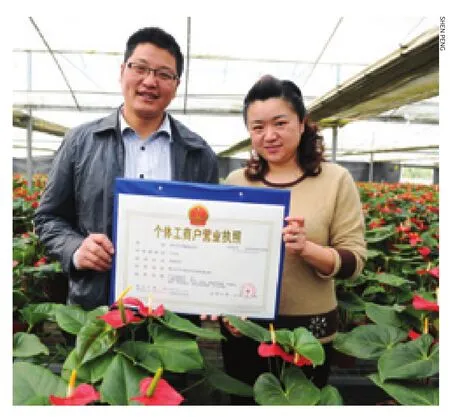The Big Land Experiment
2013-03-15YinPumin
Family farms make a comeback to revitalize China’s agriculture By Yin Pumin

In March 2012, Zhang Zecheng and his wife made up their minds to return to their roots by becoming vegetable farmers in Liangshui Village in southwest China’s Chongqing Municipality.
Before the career switch, they had left their underdeveloped hometown on the outskirts of Chongqing in search of better wages as migrant workers in Guangdong Province and worked for years.
Along with his wife and four other family members, Zhang contracted 1.3 hectares of land in the village to grow organic vegetables for urban consumers, earning more than 10,000 yuan ($1,618) each month. He has bought two cultivators and a truck to expand production.
Zhang’s business got a new boost when the Chinese Government issued its first policy document of the year on January 31, which customarily deals with agricultural policy,announcing it would encourage the establishment of bigger specialized farming units and grant more subsidies to large-scale landholders,family farms and rural cooperatives. Meeting local registration requirements, Zhang of fi cially registered his operation as a family farm on February 21.
“The recognition by authorities gives family farms the legal status to attract enough resources like personnel and funds for their further development,” said Liu Yonghao, Chairman of the New Hope Group,one of China’s largest agribusinesses based in Sichuan Province.
“Since family farms are the basic units to supply agricultural products, if their number and scale can enlarge, then China’s current agricultural situation might be alleviated,” Liu said.Urbanization is causing labor shortages in rural China.
A new trend
The concept of a “family farm” is not new in China.
For more than three years, a little-known pilot scheme has allowed qual ifi ed rural families to sign contracts with village authorities to rent management rights to large areas of arable land from other families.
Currently, more than 6,670 family farms are operating in 33 land-transfer trial programs approved by the Ministry of Agriculture (MOA),according to the Xinhua News Agency.
However, the scheme has been restrained by the household contract responsibility system introduced in the process of China’s reform and opening up 30 years ago, which then enabled farmers to use land through long-term contracts and keep their produce after paying taxes.
Under the system, farmers were confined to a small patch of land in the 1980s and 1990s,when land transfers were forbidden. The fragmentation of farmland made the use of large machinery problematic. According to the MOA,more than 80 percent of China’s farmland is operated in a decentralized fashion.
As China urbanizes, more and more farmers are moving to cities in search of better-paying jobs, abandoning agricultural work and leaving tracts of farmland deserted and fallow.
Official figures show that 52.6 percent of China’s population lived in urban areas at the end of last year. It is estimated that the country’s population could reach 1.5 billion by 2030, with only 30 percent, or 450 million people, living in rural areas.
In the long-term, a great number of rural people will leave the countryside and become pure consumers of grain instead of producers,which will put more pressure on grain supplies,said Duan Yingbi, former Director of the Of fi ce of the Central Leading Group on Rural Work, the country’s top agricultural policy-making agency.

FIELDWORK: Chinese Premier Li Keqiang (center) visits a family farm in Changshu City, east China’s Jiangsu Province, on March 28
According to the National Bureau of Statistics, China’s grain output rose 3.2 percent in 2012 to hit a record high of 590 million tons, marking the ninth consecutive year of growth. However, last year’s official customs fi gures showed the country’s grain imports also reached an all-time high of 72.3 million tons,evincing a strained balance between domestic grain supply and demand.
Encouraging young farmers to stay in their hometowns and grow grain has become an urgent problem in terms of maintaining food security, said Yin Xiaojian, Deputy Director of the Rural Economy Institute of the Jiangxi Provincial Academy of Social Sciences.
In order to tackle the problem, the Chinese Government said at the Central Rural Work Conference last December that it would strive to create systems that are more organized when it comes to agricultural production and operation. The government also pledged to increase support for new types of businesses, like family farms and specialized cooperatives.
The policy document issued on January 31 said that efforts will be made to accelerate rural land transfers to encourage development of bigger, specialized farming units, including family farms and farming cooperatives. The term“family farm” was repeatedly emphasized.
Chinese Premier Li Keqiang also stressed the importance of developing modern agriculture and “moderate-scale management” to improve farmers’ incomes during a research tour of the Yangtze River Delta in late March.“To develop modern agriculture through joint partnerships, family farms and agricultural cooperatives are China’s prime directive,” Li said.
Large-scale farming will improve land and labor ef fi ciency and provide fi rm support for urbanization, Li said, adding that farmers’ interests should be protected in the process.
According to the local government of Changshu, the value of agricultural output in the city reached 6.27 billion yuan ($1.01 billion)in 2012, up 10.5 percent from the previous year.
Tech-intensive
“Land transfers and scaled management that feature more reliance on technology should be encouraged, as they can reduce extensive reliance on labor,” Duan said.
“The problem of labor shortages in rural areas can be largely remedied if trial programs for family farms are successful,” said Liu of the New Hope Group, adding that the system could provide greater security for those who depend on the agricultural industry.
“’Family’ or ‘specialized’ farms centralize distinct plots of land to form a large-scale operation. Family farming is similar to a fixed profession, such as that seen in Western countries,” explained Guan Ruijie, an of ficial with the MOA.
“Different from traditional large households,family farms focus more on technology and management,” Guan said. “A family farm is owned and operated by one family. In China, it should also refer to one that is of a considerable scale and can ensure a family’s employment of primary manpower,” said Dang Guoying, a senior researcher with the Institute of Rural Development under the Chinese Academy of Social Sciences.
Dang believes that at China’s present stage,the general labor force of family farms should consist primarily of rural residents, while the progress of this farming format will encourage the transfer of arable land. Through mergers and expansion, some farmers will be able to rise to the level of agribusiness professionals. The transformation to family farms can increase farmers’ income and at the same time boost agricultural modernization.
Dang said, “Under good market conditions,the main restriction on a farmer’s income depends on the scale of agricultural production.Increasing the scale of each farmer’s agricultural production could steadily improve the standard of living for rural people.”
A rough calculation suggests China has to reduce its number of agricultural households to 30 million so as to ensure that rural residents’income will be on par with that of urban citizens,taking into account the continuous rise of the average urban income, according to Dang.
“The math further indicates family farms will have to operate at least 4 hectares of arable land on average to meet the criteria after any merger,” he said.
While encouraging the development of scaled family farming, the government has also expressed worry about non-agricultural development of arable land.
This year’s top document said the government won’t encourage businesses to rent large areas of farmland over a long period. It will tighten thresholds and establish a supervision system for industrial and commercial enterprises that rent farmers’ land for agricultural production.
In recent years, non-agricultural businesses have shown growing enthusiasm in investing in agriculture as the Central Government increased support for the sector. Song Hongyuan, a researcher with the Research Center for Rural Economy affiliated with the MOA, said that the government must heighten vigilance against the use of farmland for non-agricultural purposes,adding that all legal land transfers should be done on a voluntary basis by farmers.
According to the MOA, local governments are encouraged to take the lead in formulating their own standards for family farms and introducing preferential policies in terms of land rent,fi nancing, insurance, tax and so on.
A role model
As a pilot area, Shanghai’s Songjiang District—traditionally a major granary for the city—started experimenting with family farm development in 2007.
It is an attempt to improve the scarce agricultural production left by those who have moved to major cities by sharing the knowledge of experienced and creative farmers, the local government said.
According to the local government, about 90 percent of rural residents had non-agricultural jobs in Songjiang in 2007. Only 6.6 percent, or 12,500 people, were directly engaged in farming.
“The key point in tackling the labor shortage remains how to raise farmers’ incomes.Once people discover that farming brings a much higher return than working in a factory, it will become a more attractive option,” said Xu Aifang, Deputy Director of the Agriculture Of fi ce of Yexie Town in Songjiang.
Today, around 80 percent of the 9,100 hectares of arable land in Songjiang is operated by about 2,000 family farms.
In the district’s Maogang Town, 162 families rent plots of land ranging between 5 and 13 hectares each. One plot belongs to Zhang Xiaodi and his wife. Now 49, Zhang Xiaodi worked as a carpenter and a driver before fi nally settling on farming.
Chen Jiming, deputy head of the Huangqiao Villagers’ Committee, praises Zhang Xiaodi for his brilliant approach to farm work. His fi ndings,such as sowing rice before June 10 would produce higher yields, have bene fi tted many local farmers, Chen said.

In Songjiang, the operation of family farms has increased the average rice yield per hectare by 570 kg from a decade ago, according to the Songjiang Agriculture Commission.
Larger-scale family operations allow manpower to reach full potential and ensure decent incomes for farmers. Family farms should guarantee twice the incomes people earn in cities,otherwise no one will want to do it, of fi cials with the commission said.
The net income of Zhang Xiaodi’s family last year amounted to 200,000 yuan ($32,000), 80 percent of which came from rice production.That’s higher than the average salary earned by local civil servants, according to Chen.
In 2012, the average per-capita income on family farms that produce grain and raise pigs reached 50,000 yuan ($8,000), while other rural residents earned no more than 18,000 yuan($2,900). The gap is even larger when preferential policies for family farms such as subsidies are included.
Jiang Yongqiu, 58, is an experienced tractor driver and rice farmer in Songjiang’s Tongjian Village. He said that he earned more than 80,000 yuan ($13,000) planting rice on his family farm last year. The sum was something he had dared not to imagine before, having earned a minimal wage for most of his life.
Jiang has been renting land from the 40 families in his village since 2007. The rent is 10,500 yuan ($1,685) per hectare, but he receives 9,150 yuan ($1,469) per hectare in subsidies, paid to encourage the growth of family farms. “The cost of the land is almost totally covered by the government,” he said.


PROUD FAMILY: Yu Yongjun and his wife show off the business license for their family farm in Yangjian Town,Jiangsu Province, the first of its kind in the province, on March 7
However, when the pilot program launched,few people were willing to join, largely because of concerns about the relatively large input required for farmland of more than 7 hectares and concerns about the duration of the government’s subsidy policy, said Xu.
“But too many people are applying to join the program these days and we have had to raise the qualification requirements to select qual ifi ed operators,” she said, adding that young or middle-aged rural dwellers with agricultural experience are the preferred applicants.
According to the Songjiang Agriculture Commission, the district prohibits family farms from employing non-family members. Zhang Xiaodi said that he was hesitant at first, as two people cannot handle all the work during a busy season, but his doubts disappeared after regulations allowing temporary employment were introduced.
The district has also established strict standards for husbandry on family farms. “If standards are not met, subsidies are reduced,and inspections are frequent,” the commission said.
However, the length of leases and the scale of family farms remain controversial issues in the pilot scheme. Sun Hongrong, a younger family farm operator in Tongjian Village, hopes the government will extend the term of landtransfer contracts. “A 10-year contract would be ideal,” he said.
“Furthermore, if we can contract a larger area of land, it is also good for economies of scale, which is more ef fi cient,” he said.
Although of ficial guidelines clearly state that only families with rural residence permits, or rural hukou, can join the program and full-time employment of non-family members is forbidden, industry insiders said that it is not unusual for city-based companies to enter the program.
“The guidelines are intended to prevent profit-oriented companies from ‘stealing’ the land by building houses or developing agritourism, and thus threatening the security of the grain supply. However, the laws need to be stringent to prevent unscrupulous companies from doing illegal operations,” said Cheng Cunwang, Chairman of the Tianyuan Zhengguo Bio-agriculture, an organization that promotes community-supported agriculture.
Sun said that regulation of family farms is essential to prevent the overuse of land and depletion of soil nutrients. It also helps to keep the land free from pollution caused by inappropriate disposal of plastics or the excessive use of fertilizers. ■
